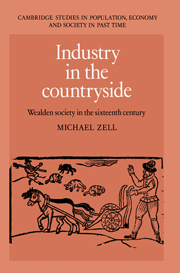Book contents
- Frontmatter
- Contents
- List of figures
- List of tables
- Acknowledgements
- List of abbreviation
- 1 Introduction
- 2 Landholding, inheritance and the local land market
- 3 Demographic movements, household structure and geographical mobility
- 4 The Wealden agrarian regime
- 5 Occupational structure and levels of wealth in the Weald
- 6 The textile industry in the Weald
- 7 Clothiers and capitalism
- 8 The Weald and ‘proto-industrialization’
- Bibliography
- Index
- Cambridge Studies in Population, Economy and Society in Past Time
7 - Clothiers and capitalism
Published online by Cambridge University Press: 13 October 2009
- Frontmatter
- Contents
- List of figures
- List of tables
- Acknowledgements
- List of abbreviation
- 1 Introduction
- 2 Landholding, inheritance and the local land market
- 3 Demographic movements, household structure and geographical mobility
- 4 The Wealden agrarian regime
- 5 Occupational structure and levels of wealth in the Weald
- 6 The textile industry in the Weald
- 7 Clothiers and capitalism
- 8 The Weald and ‘proto-industrialization’
- Bibliography
- Index
- Cambridge Studies in Population, Economy and Society in Past Time
Summary
The Wealden woollen industry was, as we have seen, the most important source of non-farming employment in the region. Many thousands depended wholly or partially on wages earned as textile workers. The majority of these outworkers relied on the master clothiers for their employment. Whether they were poor cottagers who eked out a bare subsistence by spinning wool on a part-time basis or quite well-off master weavers who also ran their own farms, most did not own the raw materials they processed. Admittedly, a small number of master weavers, or ‘kerseymakers’ manufactured their own cloths. But the lion's share of Kentish cloth production was organized by putting-out clothiers who could deploy the capital to purchase raw materials and pay the wages of the outworkers and artisans who turned wool into fine broadcloth. The clothiers, too, formed the connecting link between the regional economy and the more distant markets from where raw materials were obtained and where the finished product was sold. From the prospect of the Weald, the wealthy clothier was the dominant economic force; on his good will – and financial resources – the well-being of many thousands rested. But from the perspective of the wider English (and European) economy, how independent were the capitalist clothiers of the Weald? In the language of early-twentieth-century historians, was industrial capital – the clothiers – dominated by commercial capital, in the form of the London wholesale merchant elite?
- Type
- Chapter
- Information
- Industry in the CountrysideWealden Society in the Sixteenth Century, pp. 189 - 227Publisher: Cambridge University PressPrint publication year: 1994

